This delicious Gobi Paratha is a recipe that you will make again and again. Also known as Cauliflower paratha, these unleavened whole wheat flatbreads are stuffed with a savory, spiced grated cauliflower filling. Being one of the most popular Punjabi paratha recipes, Gobi paratha is loved by many folks. There are so many ways to make these flatbreads, but here I show you an authentic heirloom Gobi paratha recipe that is much loved in my family.
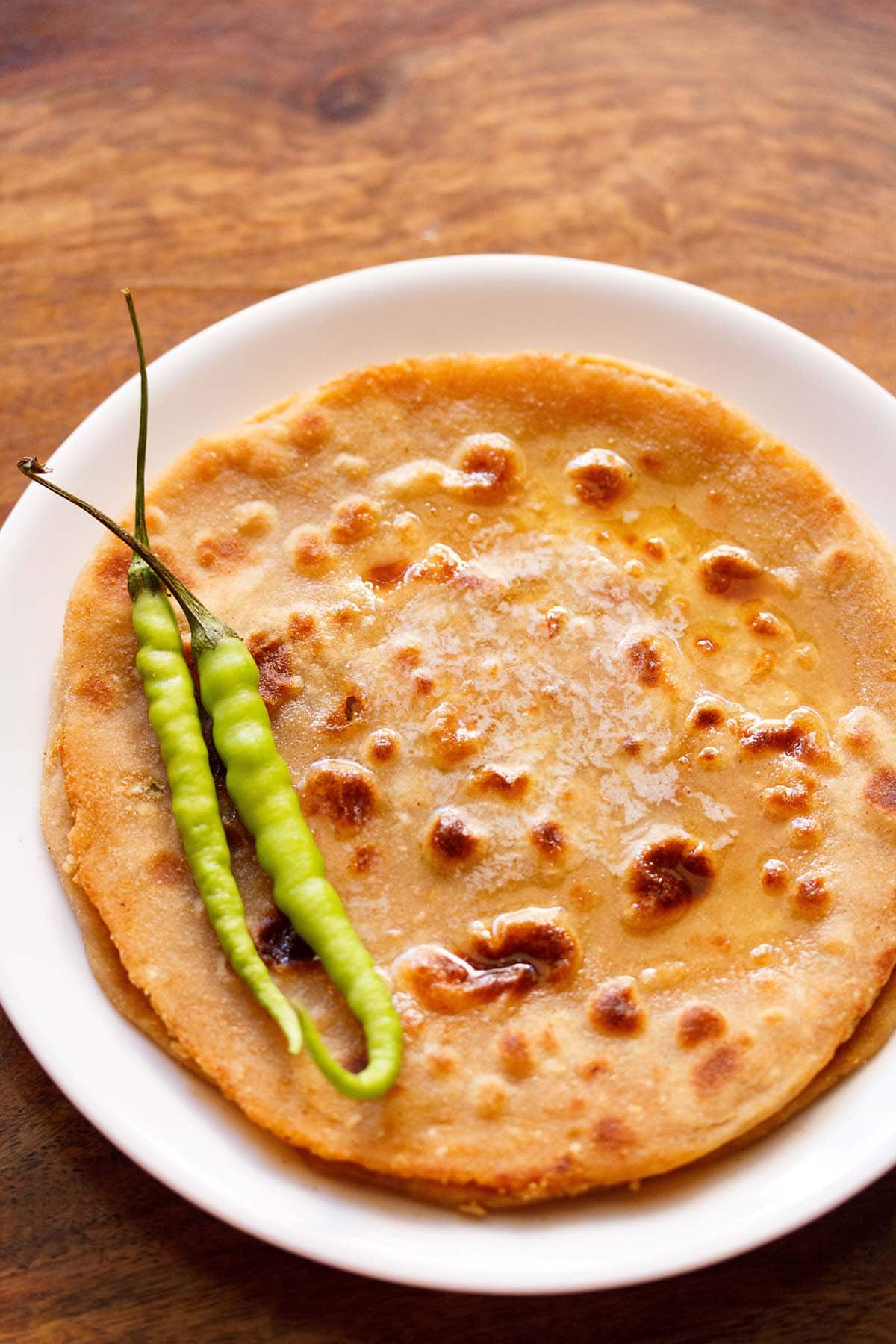
About Gobi Paratha Recipe
I first learned to make these cauliflower stuffed flatbreads from my mother-in-law. Of course, I knew how to make Aloo Paratha (potato stuffed flatbread) but not gobi paratha. I always thought making these parathas were difficult and honestly never ever tried to make it.
It was after I saw my mom-in-law making the gobi parathas, did i realize that making them is easy and not that difficult.
I make these the same way as it was made for so many decades in the family and have not changed or adapted any ingredient or style of cooking.
Table of Contents
The crispy, tasty Gobi paratha are usually made for breakfast, but of course you can make them for lunch or dinner. They can be served with white butter or curd (yogurt) or mango pickle.
Gobi paratha is often made for breakfast in Punjabi homes as well as served in restaurants and Punjabi dhabas.
We love to have them for breakfast and specially during winters as you get the best tender cauliflower in India during winters.
Why This Recipe Works
In Punjabi homes, while making gobi paratha, the cauliflower is not sautéed, stir-fried or par-cooked earlier. The fresh, raw, grated cauliflower is added straightaway in the stuffing.
When you cook the cauliflower and then use it as stuffing, the taste of these parathas are different. You do not get enough moisture in the filling and they taste somewhat dry and insipid.
The paratha made with the raw, grated cauliflower mixture has a lovely taste, texture, flavor and are better than the parathas made with cooked gobi.
Since I have made both ways I know the difference. So to get the best awesome taste in the gobi paratha I would suggest not to cook the cauliflower.
To make this Punjabi gobi paratha recipe, the cauliflower is grated finely. I usually use a hand grater for this purpose and avoid grating in the food processor which I have.
For some reason, the food processor gratings are larger than the hand grated ones. The cauliflower has to be grated finely or else when rolling, the parathas break.
I have learnt and saw my mother-in-law making so many paratha varieties. I came to know that are many varieties of stuffed and savory paratha recipes. I have shared some of them like:
Breakfast Recipes
Breakfast Recipes
Breakfast Recipes
Breakfast Recipes
How to make Gobi Paratha
Make Cauliflower Filling
1. Firstly rinse ½ of a cauliflower head very well. Check insects and worms in the cauliflower and if there, then discard that part.
Rinse very well in fresh running water. Then drain the water very well. You can wipe dry the cauliflower with a kitchen towel as well.
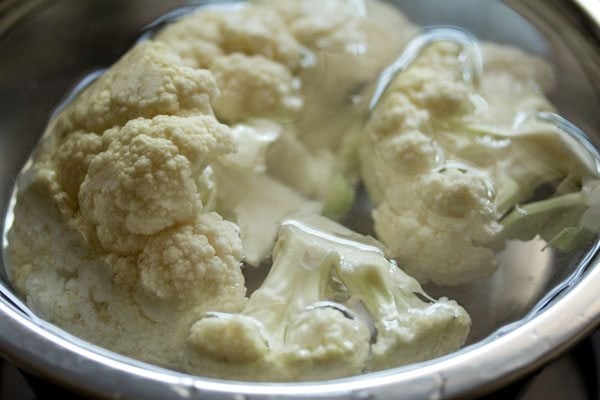
2. Then grate the cauliflower pieces using a fine grater. If using a food processor, make sure that it grates the cauliflower finely.
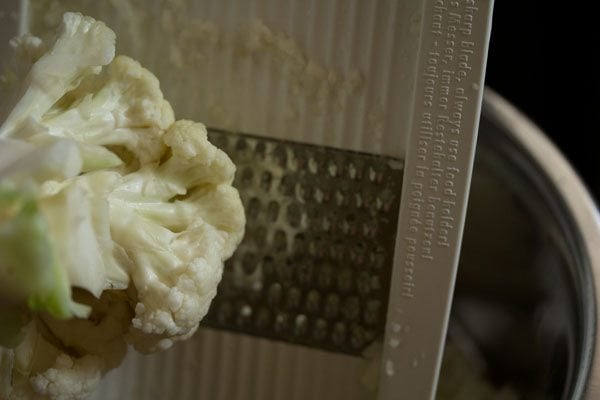
3. Keep the grated cauliflower in a bowl.
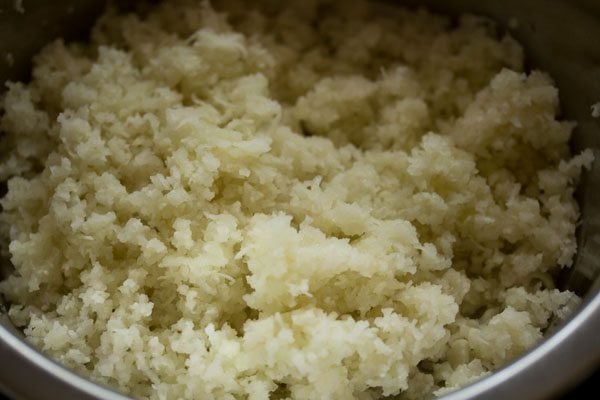
4. Add 1 finely chopped green chili to it (about 1 teaspoon finely chopped). Uniformly mix the green chilies with the gobi. Keep aside.
For a spicy taste, you can add 2 green chilies.
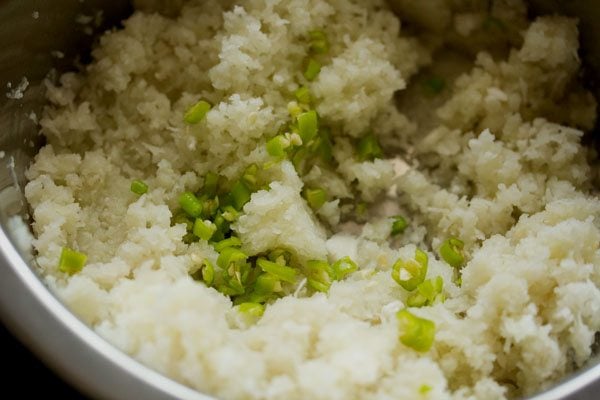
Knead Paratha Dough
5. In a bowl take 3 cups whole wheat flour along with 1 teaspoon salt (or as required).
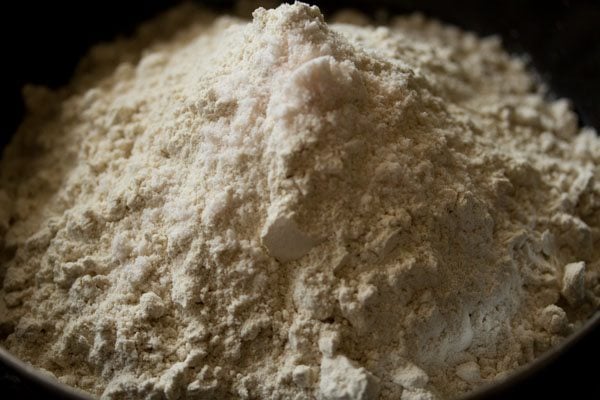
6. Add 1 tablespoon ghee or oil.
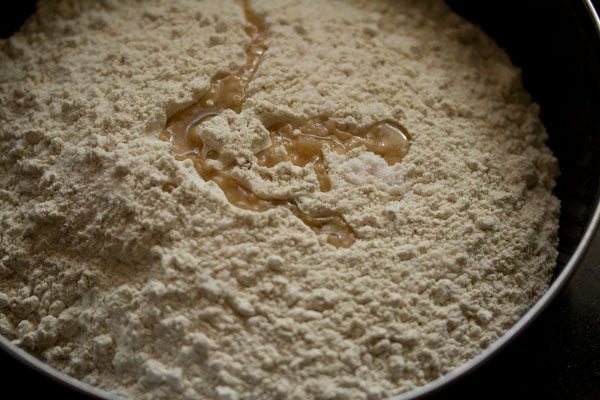
7. Next add 1 cup water or as required.
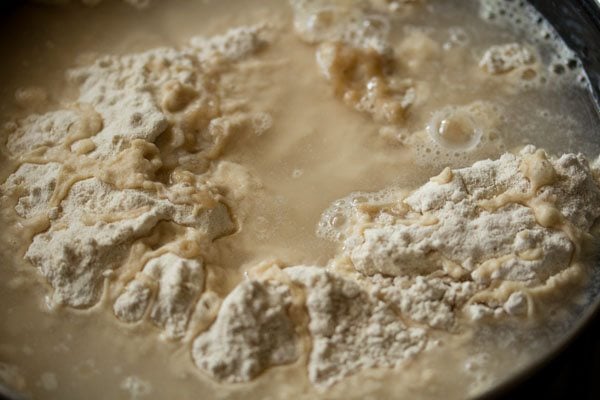
8. Knead the wheat flour with water to a smooth and soft dough. Cover and rest the dough for 20 to 30 minutes.
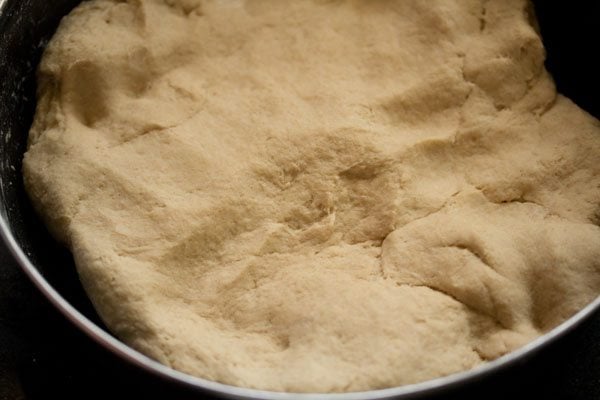
Fill Paratha with Gobi Stuffing
9. Later take 2 small to medium sized balls from the dough.
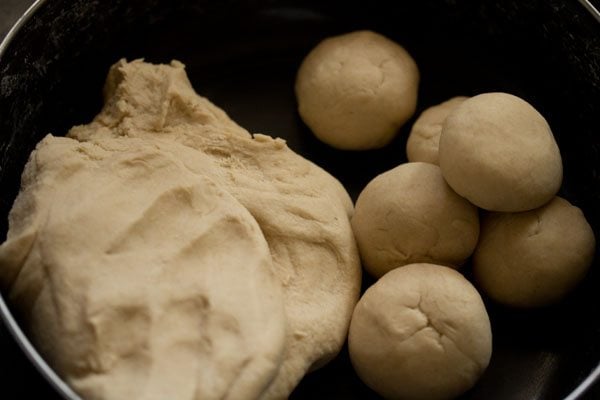
10. Dust them with some flour on the rolling board.
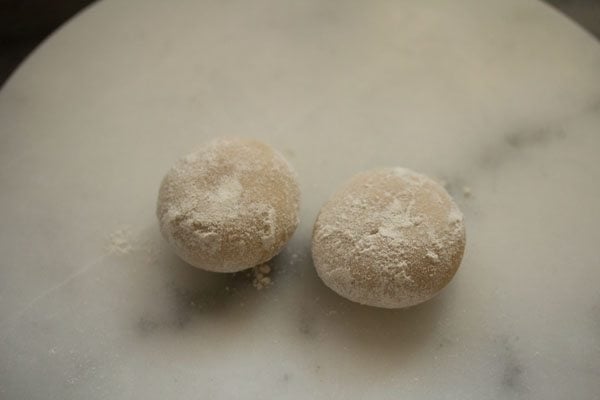
11. With a rolling pin, roll both the dough balls to a size of about 3 to 4 inches in diameter.
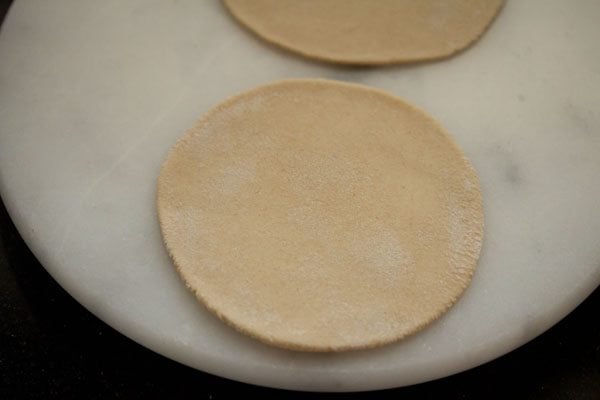
12. Now spread some ghee (clarified butter) or oil over one of the rolled disc.
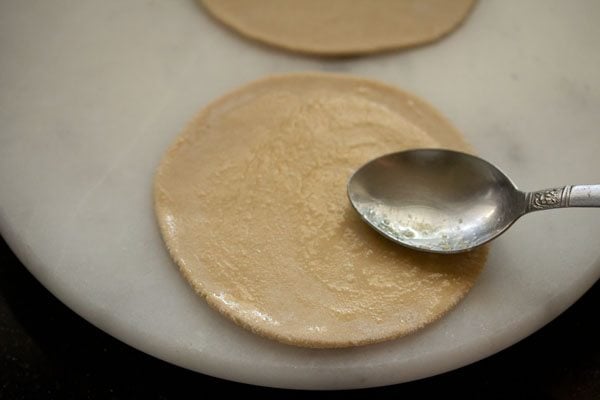
13. Top it with a few tablespoons of the grated cauliflower mix and keep about 1 inch empty space from the sides.
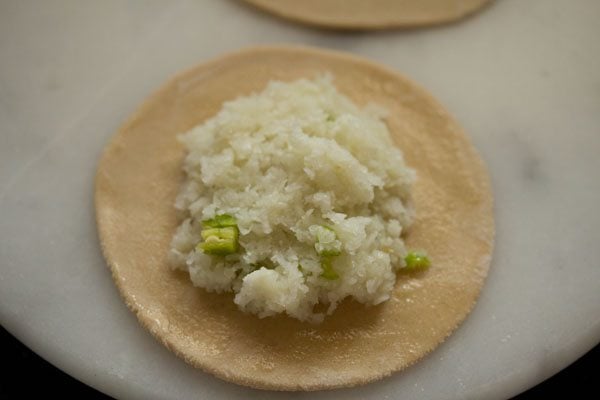
14. Sprinkle 1 to 2 pinches of salt, red chili powder and garam masala powder all over on the grated cauliflower. You can add a few more pinches of the red chilli powder if you prefer.
A tip, which I also follow, is to mix 1 teaspoon each of red chilli powder, garam masala powder and ½ teaspoon of salt in a small bowl. Mix it and sprinkle a few pinches of this spice mix on the cauliflower filling.
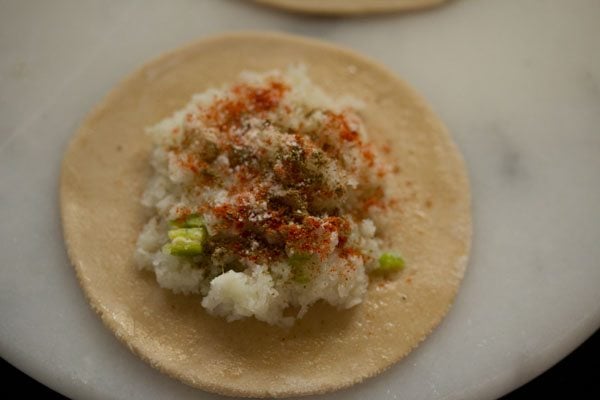
15. Also sprinkle some wheat flour. As the grated cauliflower tends to be moist, sprinkling little wheat flour helps the parathas not to be moist and sticky when rolling with a rolling pin.
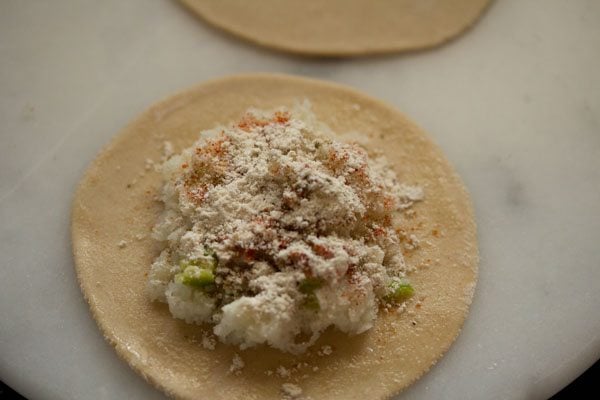
16. Cover with the other rolled dough.
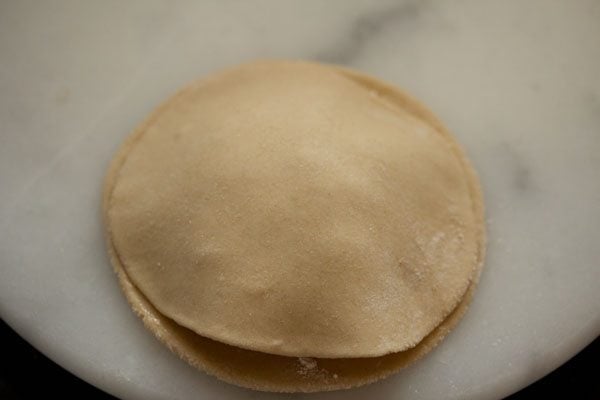
17. Press and seal the edges very well with your fingertips.
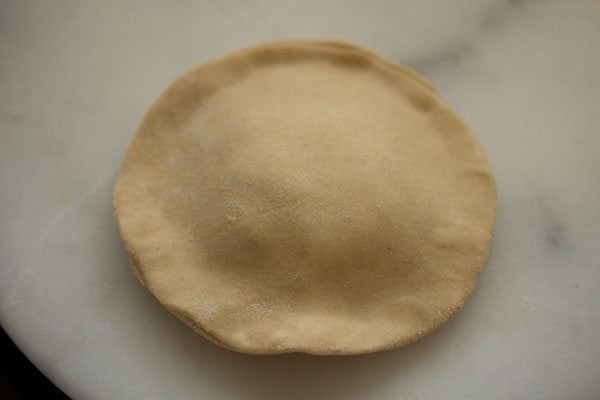
18. Dust some flour on the stuffed paratha and start rolling the paratha. I find this stuffing technique easier than the one where you fill the cauliflower stuffing in a rolled dough ball. But you choose what is easier for you.
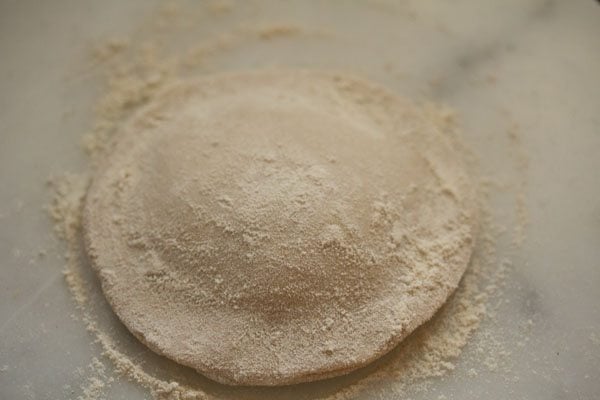
19. Now with a rolling pin, roll very gently and lightly till you get the paratha to a size of a chapati or roti – about 6 to 8 inches. You have to be a little quick enough to roll out the paratha as we have added salt to the gobi and thus it releases some water.
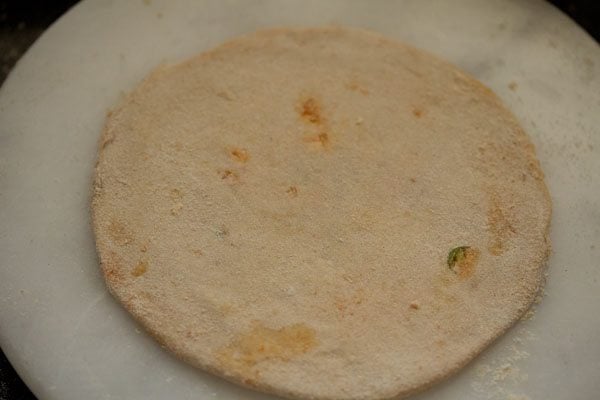
Cook Gobi Paratha
20. So before the juices are released from the gobi, your paratha should be on the hot pan. Place the paratha on a hot skillet, tawa or flat pan.
The skillet has to be hot and on medium-high to high heat. Trust me making gobi paratha is easy and not at all difficult. Once you get the knack, you will be a master in making any parathas 🙂
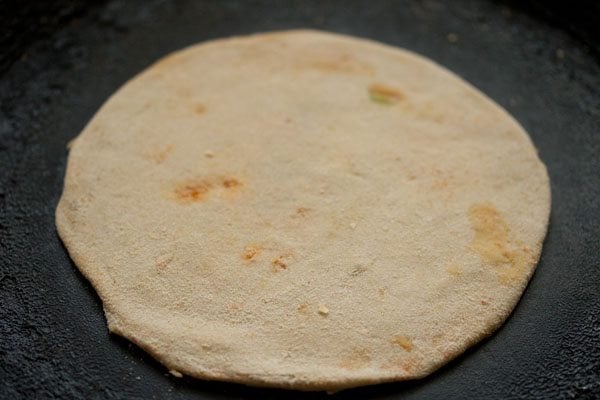
21. Let the paratha cook partly, about ¼.
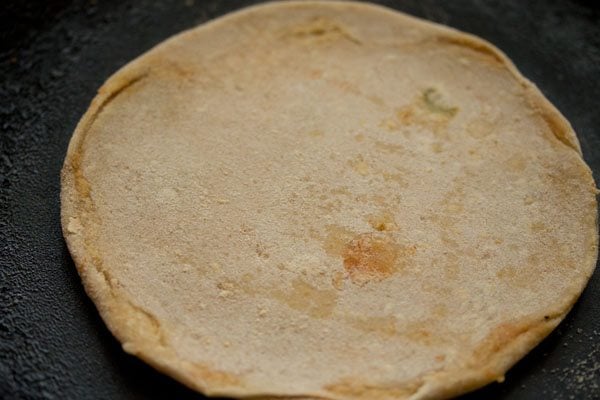
22. When the bottom side is ¼ cooked, flip the paratha using a spatula and spread ghee or oil on the cooked side. Be liberal with the ghee.
A paratha is not complete without ghee and especially good amounts of ghee, so don’t be a miser. You can also use oil instead of ghee.
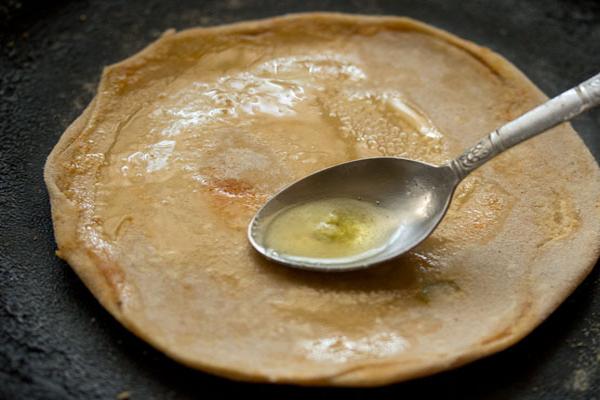
23. Flip the second time. So now the side, where ghee is applied goes at the bottom.
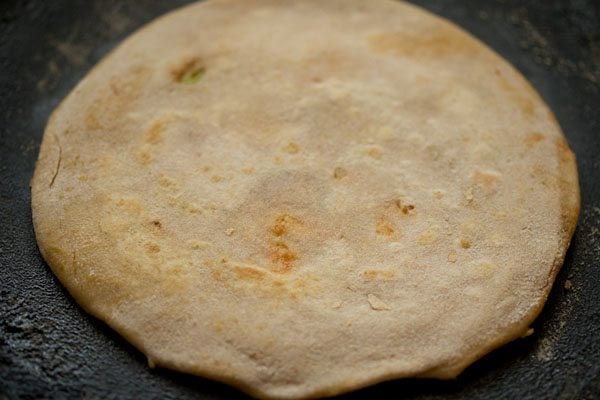
24. Apply ghee or oil on the top side.
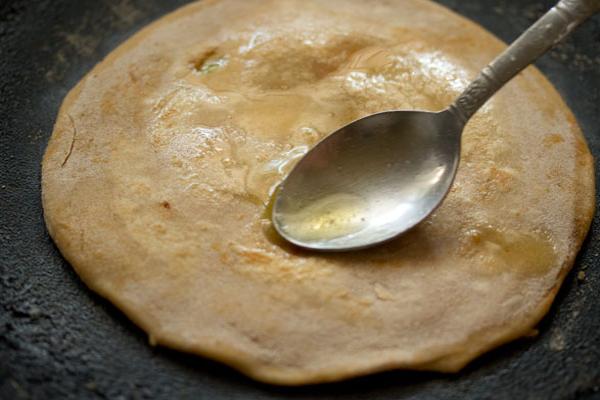
25. Flip for the third time and then a fourth time making sure that the gobi paratha is cooked evenly and well browned.
Make sure that the edges of paratha are cooked well. You can also press the edges with a spatula or spoon. If the gobhi paratha is roasted properly then it will slightly puff up.
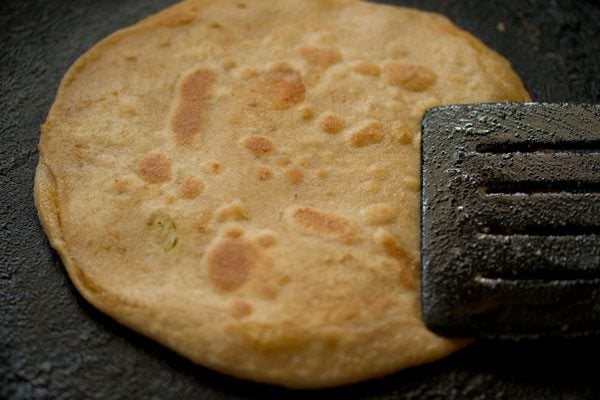
26. Roast the gobhi ka paratha very well till you see golden or brownish-black blisters on top. Make all paratha this way. Stack the parathas in a roti basket.
I multitask when I make these. So I stuff and roll the parathas and cook them at the same time. If you cannot multitask, then take a help from your family when cooking these.
I would not recommend to roll all the parathas and then later cook, as the cauliflower releases moisture and it can be difficult to lift the paratha if there is too much moisture in it.
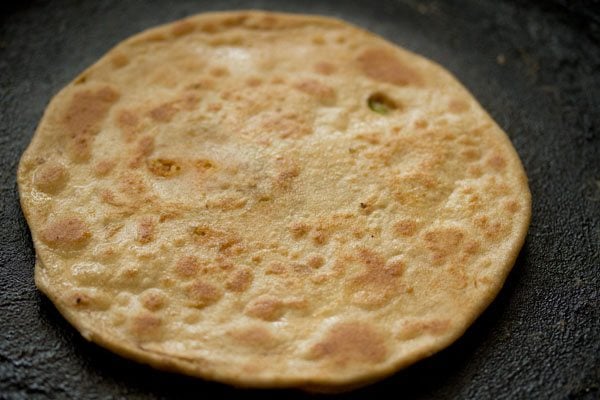
27. Serve Gobi paratha hot or warm with curd, pickle or white butter. They can also be packed for a tiffin box.
They can be had for any time of the day but usually had during breakfast or packed for lunch box.
As you see in the photos, you can optionally eat them with raw green chillies. But ensure that the green chillies are not very pungent or spicy. These chillies which are served with gobhi paratha or any paratha do not have a sharp pungent taste and are mild.
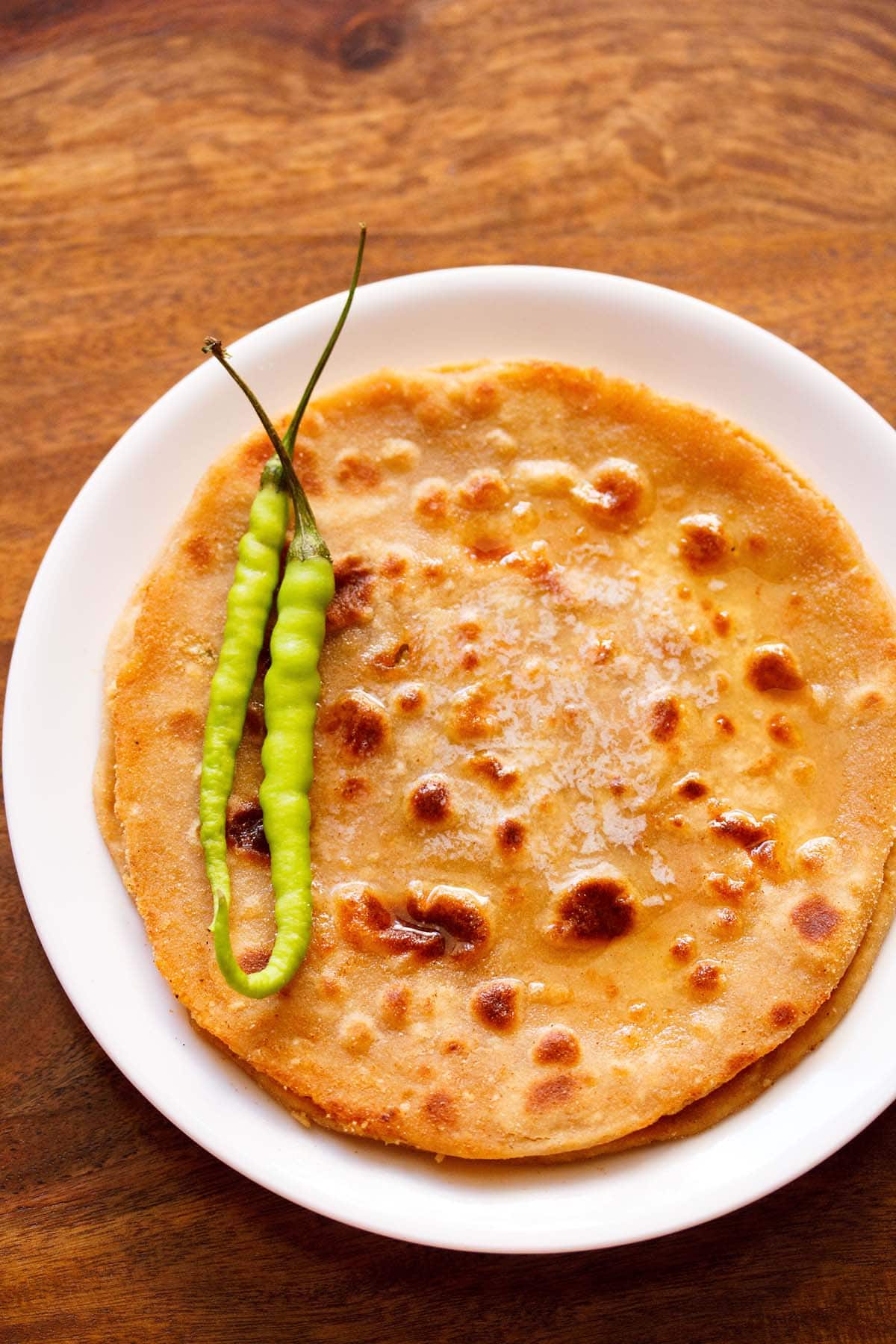
Expert Tips
- Cauliflower: Ensure to use fresh tender cauliflower. Do not use frozen or blanched cauliflower as they leave too much water when grated – which makes it difficult to stuff and roll the paratha.
- Spicing: For a spicy taste, increase the amount of green chilies. You can also add some chopped coriander leaves to the stuffing, but the taste changes.
- Grating: Make sure that the cauliflower is grated finely. Larger gratings or shredded cauliflower won’t be easy to fill in the paratha and will tear it while rolling.
- Scaling: You can easily make a small batch or a large batch of these flatbreads.
- Stuffing: Keep in mind not to overstuff or under-stuff the paratha. Overstuffed paratha will break and tear while rolling. While an under-stuffed paratha will lack the flavor of the savory cauliflower stuffing.
- Dough: For the crisp and smooth texture in your paratha, knead the dough to a smooth and soft texture. A dense dough will make up for chewy and dry paratha. While a sticky dough won’t be easy to roll and also won’t hold the stuffing.
Please be sure to rate the recipe in the recipe card or leave a comment below if you have made it. For more vegetarian inspirations, Sign Up for my emails or follow me on Instagram, Youtube, Facebook, Pinterest or Twitter.
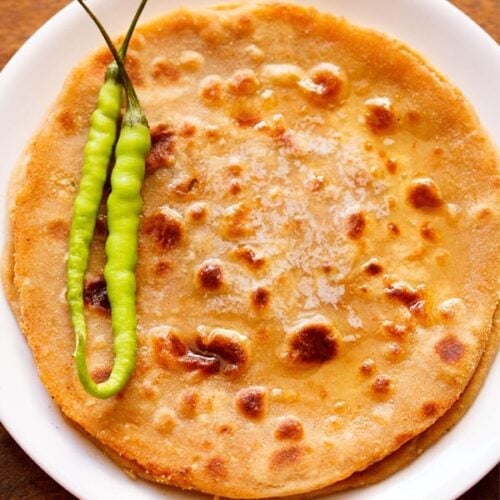
Gobi Paratha Recipe (Punjabi Cauliflower Paratha)
Ingredients
For dough
- 3 cups whole wheat flour – 360 grams
- 1 cup water or add more if required
- 1 teaspoon salt or as required – optional
- 1 tablespoon Ghee or oil, add as required – optional
For cauliflower stuffing
- ½ cauliflower head – finely grated
- 1 green chili – chopped finely or 1 teaspoon finely chopped
- 1 teaspoon Garam Masala or as required
- 1 teaspoon red chili powder or as required
- salt as required
For roasting
- Ghee (clarified butter) or oil as required
Instructions
Kneading dough
- In a bowl take the whole wheat flour along with salt as required. Add 1 tablespoon ghee or oil.
- Next add 1 cup water or as required. Knead the wheat flour with water to a smooth and soft dough.
- Cover and keep aside for 20 to 30 minutes.
Making cauliflower stuffing
- Rinse the cauliflower head very well.
- Then grate cauliflower with a fine grater all the way through until you come to the stalks. Do not grate the stalks.
- Add some finely chopped green chilies to it.
- Uniformly mix the green chilies with the grated cauliflower. Set aside.
Making gobi paratha
- Later take 2 small to medium sized balls from the dough. Dust them with some flour on the rolling board.
- With a rolling pin (belan), roll both the dough balls to a size of about 3 to 4 inches in diameter.
- Now spread some ghee over one of the rolled disc. Top it with a few tablespoons of the grated cauliflower mix and keep about 1 inch empty space from the sides.
- Sprinkle 1 to 2 pinches of salt, red chili powder and garam masala powder all over evenly on the grated cauliflower filling.
- Also sprinkle some wheat flour. As the grated cauliflower tend to be moist, sprinkling little wheat flour helps the parathas not to be moist and sticky when rolling with a rolling pin (belan).
- Be careful as not to under-stuff or overstuff the paratha. Cover with the other rolled dough or disc.
- Press and seal the edges very well with your fingertips.
- Dust some flour on the stuffed paratha and start rolling the gobi paratha with the help of a rolling pin (belan). Roll very gently and lightly till you get the paratha to a size of a chapati or roti, about 6 to 8 inches.
Roasting
- On a hot tava (tawa or skillet or griddle) place the rolled gobi paratha.
- Roast the gobhi paratha with ghee till browned and uniformly roasted on both sides on a medium-high to high heat.
- You can also press the gobhi paratha edges with a spatula or spoon, so that they are fried well. As some time, the paratha edges are not cooked well.
- Make all gobhi paratha this way and stack them up in a roti basket or casserole.
- Serve gobi paratha hot or warm with yogurt, pickle or white butter.
Notes
- The recipe can be scaled easily.
- To make a spicy stuffing add more green chilies.
- Use fresh tender cauliflower.
- Don’t blanch cauliflower as after grating they release a lot of water and make it difficult to make the paratha.
- Don’t overstuff or under-stuff the paratha with the stuffing. Overstuffed paratha will break while rolling. While an understuffed paratha will lack the flavor of the savory cauliflower stuffing.
- Ensure that the cauliflower is grated finely. The cauliflower is not minced and nor does have large shreds.
- Knead the dough to a smooth and soft texture.
- Note that the approximate nutrition info is for 1 gobi paratha.
Nutrition Info (Approximate Values)
Gobi Paratha recipe from the archives was first published on November 2011. It has been updated on December 2024.
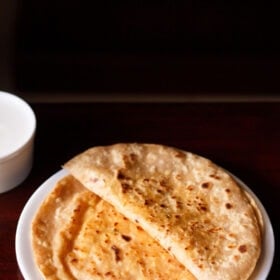
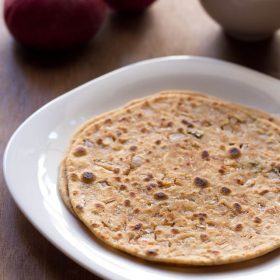
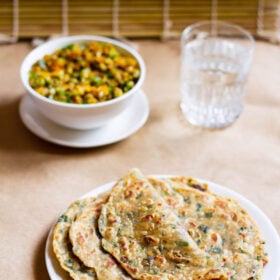
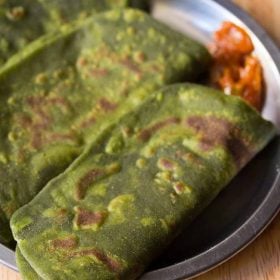
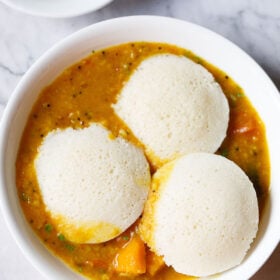
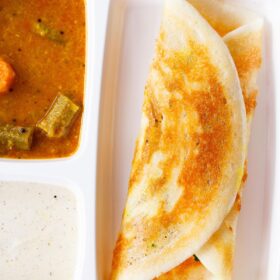
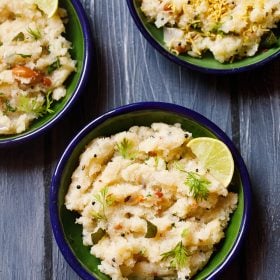
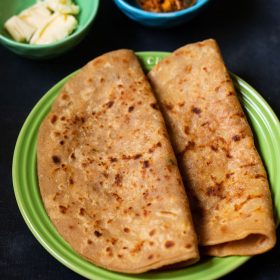








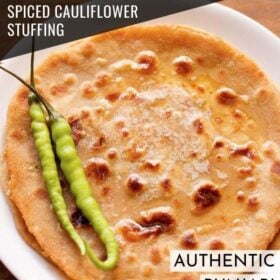
This is so good recipe ! 🥶
I’ve been making for breakfast w/ vegan dahi & achar. Delicious.
I’ve bookmarked your onion parantha recipe for later, I’d never heard of that. I’m Punjabi and only had heard of gobi & mooli ones.
I’m working on veganizing some of your paneer recipes, making with extra firm tofu, will leave comments for those in future soon 🥶
Thanks Radha. Onion Paratha is also made in Punjabi households. Do try them. They taste nice. You can also dry dal paratha. Takes more time to prep, but tastes very good. Sure, do comment on these recipes. Thanks for the rating on this recipe as well.
How do you make your Onion parathas? Thanks.
I have shared the recipe on the website. Kindly use the search option to get the recipe.
Making parathas this way was simple and less time consuming.adding good amount of ghee makes a huge difference. I realised this after you repeatedly mention in all such posts.also the grated cauliflower in the stuffing tastes too good.
yes, adding ghee makes a big difference. with fresh grated cauliflower, the taste is too good. with precooked cauliflower stuffing, the taste is completely different. thanks again winnie.
Loved the recipe Ma’am! Took me quite some time but it started getting easier. My wife liked the parathas too. Only problem I faced was that the cauliflower flakes were flying around the kitchen while grating the vegetable.
I feel adding fresh coriander in the stuffing will enhance the taste. Will try that the next time.
Though this is the first time I’m commenting, I keep visiting your site for recipes and like them for their simple preparation and nutritional value.
Thank you and keep posting new varieties!
thank you vivek for this detailed feedback and for the rating too. yes, that happens when grating cauliflower. i use a large plate, so that whatever flakes fly fall on the plate. definitely, you can add fresh coriander. it will give a nice taste.
thank you very much. welcome and yes i will keep adding new recipes.
your recipe is awesome I like it. I like it please check my recipe.
I love your website…..the instructions are very detailed and makes it very easy to follow the steps and make the food….you should hv an APP so that i don hv to open the web browser and google for ur recipes
thanks. we had an app but unfortunately we had to remove it due to reader complaints. hopefully in the future we may launch an app again.
Thankyou the parathas turned out quite good.
welcome and thanks.
Made this version of gobi paratha for the first time today. Just loved it. Thanks Dassana!
thank you megha ????. glad to know ????
I am blessed to have known your website. Tried making these parantha many times but it was always disaster. Today I made them they rolled out perfectly. Lots of love to you. Keep sharing your recipes,????
thank you shabistan. glad to know and happy cooking.
I tried the recepie…it taste yummy..but the problem i found is to roll after stuffing because of moisture. It get stick in the balen and on the surface. therefore, the paratha beocmes very thick. Any sugesstion please.
krutika, the parathas have to be rolled quickly before the moisture starts oozing out. you can also make two rotis and place the stuffing between the rotis and then seal. this way the moisture does not come out easily as there are two layers of rotis. there is another way, where the gobi can be sautéed in some oil till its moisture dries up. you can do this way. another method is to sprinkle some salt on the grated gobi. mix and keep covered for 10 to 15 minutes. then squeeze the gobi to remove all the excess moisture. keep aside. then add the green chilies and other spices.
I tried mixing salt and other spices into the grated gobhi to begin with. Although it gives out a bit of moisture, making the filling slightly tricky to manage, but I think it tastes juicier (even when you haven’t applied oil/ ghee to it to cook).
It’s better for those who suffer from health problems and want to avoid fats. It tastes like a tandoori parantha then 🙂
thanks stuti for letting me know. i have never made these parathas without oil/ghee, but i should try. the gobi filling as its not cooked, makes it tender, juicier and moist when cooked. i have also tried once the sauteed gobi version, but i felt the stuffing to be dry and none of us liked it. since this is a family recipe, no wonder we prefer this one over the precooked gobi stuffing.
Thanks Dasanna. I tried your methi parata and tat was so simple n wonderful. Just wondering why the same method can’t be followed for go I parata, where we just make the dough with the Gobi added also, instead of stuffing it and rolling it later. Pls let me know..:) Hare Krishna.
divyapriya, with grated gobi, firstly the dough becomes too moist/wet as the gobi releases its juices in the dough. even if the moisture issue can be solved, but the second issue of rolling the parathas becomes difficult. either the gobi has to be minced and then added or made into a paste and then added. with a paste, the taste will change. so i think mincing would be fine. also either no water or very less water has to be added. the dough will be required to give a rest of 30 minutes. you can try this way. after 30 minutes, if the dough becomes too moist, than just add some flour and knead again. do let me know how the gobi parathas made this way turn out. hare krishna
Thanks for your detailed reply, dasanna:) will try n let you know.. Hare Krishna 🙂
welcome divyapriya. hare krishna 🙂
hm… I think I need to try again. My dough was very think and my parathas did not puff 🙁 I’m not sure what the issue is. I cook often but typically do not make dough!
ulrika there is high possibility the dough in not kneaded properly or something has gone wrong. if the dough is kneaded well the parathas should puff up also the heat should be medium while cooking parathas. hope this help’s you.
It’s really amazing
thankyou damayanti 🙂
It is very helpful to me.thank you
welcome sanjay 🙂
I just try gobi paratha,only problem I got over here is paratha is slightly thik than what I expect. Please can you suggest me what to do to avoid this?
try rolling the dough into slightly thin rounds. this should solve the problem.
Your website is amazing. I really like your recipes especially the South Indian ones. For this, as a variation I would recommend that you try adding some finely grated ginger and chopped coriander along with the green chillies. They give a wonderfully fresh and flavourful kick to this
thank madhvi and thanks for the suggestions. i will try 🙂
This looks delicious, and easy enough that a newbie like me could probably manage it. I used to order gobi paratha often when I lived in the city but I’ve moved to a very rural area and cannot get it here.
Thanks for the recipe!
welcome lindsay. do give it a try.
Tried the gobi parathas today .. very simple and a great success .. I followed your method .. thank you. 🙂
welcome lourdes
Your all recipes r too good, simple n easy to make.I have tried many recipes which have made my food more tasty. Today I’m trying this one n I know this will b also tastier. Thank you
welcome archana. glad to know this. thanks for sharing positive feedback on recipes.
We can also lightly stir fry the gobhi mixture after adding salt to whole of it, to reduce the released water. I do this also for pyaz paratha.
akshat, yes we can do it. but this family recipe of gobi paratha is how we have been making it since generations. there are many variations of every recipe and it varies from family to family.
instead of putting salt and all masalas in every ball of dough what can be done is, (this is how my mum taught me to make it) you can add salt to the dough while kneading it and add the masala’s (garam masala, red chilli powder, chopped coriander and cumin seeds + a little bit of melted asafoetida-if needed) in the grated cauliflower and then stuff it in…
the ground rule is to never add salt to grated cauliflower as it ruins the consistency.. adding salt and other masala’s every single time you make a paratha can be quiet cumbersome.
thanks for sharing the suggestions deepika. the method shown here is how we make the paratha for many years now. i learnt this from my mil and til today she makes it like this. salt we already add to the dough. just adding a pinch of salt to the cauliflower so that there is a slight salted taste, otherwise even with the salt in the dough, the cauliflower stuffing tastes bland without salt.
I agree with you wow ,that’s very good and smart way,I’ll follow your method,Thanks!
Its really awesooomee…….
Thanks Dassana,,..,…….
welcome mukul
Excellent site for those who loves cooking….
thanks shweta
Thank you for your excellent paratha recipes. My favourite is onion, but I enjoy a change so appreciated your varied list. Chocolate or jam fillings would go well with the children, I think.
welcome bob. yes they will go well. in fact there is one chocolate paratha recipe also.
I tried this .. it’s really awesssssooooommmmm
Thank you so much .. 🙂
welcome usha
Its good to have it
I have tried out this recipe $ it came out deliciously
thanks.
very nice
Hi dassana,
Tell me one thing, that gobi should be boiled one or it should be the raw gobi…?
any ways your recipe is nice loved this and will try tomorrow..
Suheel
if the gobi or cauliflower you get in your place, is clean and without any insects, then you just rinse it and grate it. if there are insects, then it needs to be kept in salted hot water water for about 20 mins and then drained and then grated. boil the water first with salt. add the gobi and switch off the flame. cover the pan and keep the gobi in the hot water for 20 mins.
Thanks dassana…
it helped me and the recipe was so good…
welcome suheel
Thanx for the recipe… I think with this I can satisfy my partner who is always wanting new kind of delicious breakfasts….. these recipes are a great help to the new brides……….
welcome disha. keep visiting the blog for new recipes.
It was really very good, I tired it, The way you have explained, it was very easy to understand & Prepare.
thanks devika.
Hi dassana most of your paratha recipes doesn’t call for yeast or any rising ingredients is this normal for Indian parathas? I’m West Indian and my mom uses baking powder in her rotis and I would like to try this recipe. I love your website and have tried many of your other recipes and they always come out amazing! Please keep posting and thanks for sharing them!
hi lynda. it is very normal in the indian household not to add yeast or any rising ingredients while making parathas. there are some indian breads like the naan, kulcha or the kerala paratha where yeast or other rising ingredients are added. but generally rotis and parathas is a staple food in most indian households and we don’t add baking powder to them. thanks for the feedback lynda. glad to know the recipes have always come out amazing.
Hi !
I tried this recipe and it came out very deliciously . I followed same step by step procedure what you mentioned… thanx for the great recipe…
welcome bhargavi.
I found to my dismay that my wholemeal flour was out of date, so I used regular plain flour. I also used a tandoori masala spice mix with the cauliflower and I coated it with regular butter.
Unorthodox, perhaps. But it tasted amazing!
dear gary, thats an interesting mix of cauliflower with tandoori masala and butter. i am sure it must have been yum…
It sure was – it’s quite hard to get ghee (and I was too lazy to clarify it last night). So regular butter works quite nicely on the outside of the paratha.
I served it with a nice, red, aloo dum and they work together quite well. I fully recommend it.
regular butter does go well with parathas. usually at home we fry the parathas with ghee and serve with butter. but in the absence of ghee, butter works well for frying the parathas.
dum aloo and gobi paratha is a great combo…
A variation of this paratha with broccoli or a combination of cauli and broccoli tastes yummy as well;it is a favorite in my house:)
thanks hetal for this awesome suggestion. i will try this one next time.
I made aloo gobi for dinner tonight and have half a cauliflower left, I wondered what I was going to do with it, now I know! Thanks, you always know what I need!!
thank you natalie… do try and let me know….
This sounds so yummy. I am saving this post and making it when the cauliflower starts rolling in this winter. Thank you.
whenever you try the recipe sharyn, do let me know how it turned out.
just awesome